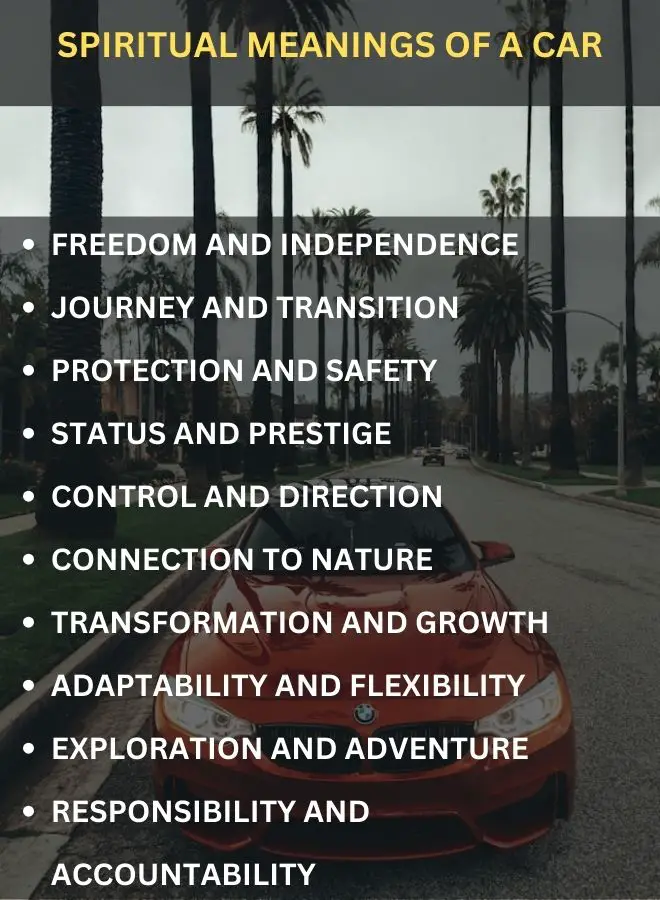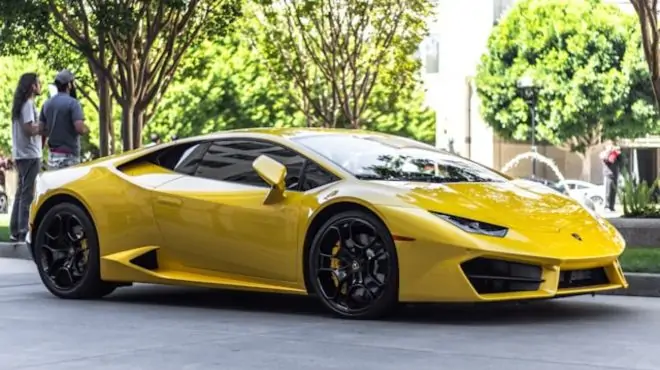Cars symbolize freedom, journey, and protection. They represent status, control, and connection to nature, fostering growth, adaptability, and exploration while emphasizing responsibility.
Have you ever paused to ponder the profound meaning behind something as commonplace as a car? Beyond its mechanical functionalities and practical uses, a car holds a deeper spiritual significance that often goes unnoticed in our fast-paced lives. Join me on this enlightening journey as we delve into the spiritual realm of cars, uncovering their hidden meanings and cultural significance.
Spiritual Meanings of a Car
Cars, beyond their utilitarian purposes, hold deep symbolic significance in various spiritual and philosophical contexts. Let’s explore some of the most common spiritual meanings attributed to cars:

1. Freedom and Independence:
Cars symbolize freedom, offering individuals the autonomy to travel wherever they desire without constraints. The ability to hop into a car and drive represents liberation from limitations and the power to explore new horizons.
2. Journey and Transition:
Each ride in a car parallels life’s journey, representing transitions, growth, and evolution. The roads we traverse symbolize the paths we take in life, filled with twists, turns, and unexpected detours.
3. Protection and Safety:
Cars provide a sense of security and protection, serving as a shield against external dangers. Within the confines of a car, individuals feel sheltered and secure, fostering a sense of safety during travels.
4. Status and Prestige:
For many, the type of car one drives reflects social status and prestige. Certain vehicles signify success, wealth, and societal standing, serving as status symbols in various communities.
5. Control and Direction:
Behind the wheel, individuals assume control over their destinies, navigating through life’s uncertainties with confidence. Driving represents taking charge of one’s path and steering it towards desired destinations.
6. Connection to Nature:
Despite being man-made, cars connect individuals to the natural world. Whether cruising through scenic landscapes or feeling the wind against one’s face, cars facilitate a profound connection with nature.
7. Transformation and Growth:
Like humans, cars undergo transformations and require maintenance to function optimally. Each journey in a car symbolizes personal growth, resilience, and the need for continual self-improvement.
8. Adaptability and Flexibility:
Cars exemplify adaptability, capable of navigating diverse terrains and environments. Similarly, individuals must remain flexible and adaptable in life, embracing change and overcoming obstacles with ease.
9. Exploration and Adventure:
Cars inspire a spirit of exploration and adventure, beckoning individuals to embark on journeys of discovery. Whether embarking on road trips or spontaneous drives, cars facilitate the pursuit of new experiences.
10. Responsibility and Accountability:
Driving entails responsibilities towards oneself and others on the road. Cars symbolize accountability, reminding individuals of the importance of practicing safe and mindful driving habits.
Variations and Spiritual Meanings of a Car
Cars come in various shapes, sizes, and designs, each carrying its own unique spiritual significance. Let’s explore the different variations of cars and the spiritual meanings they embody:
1. Sports Cars: Speed and Thrill
Sports cars symbolize speed, agility, and the exhilaration of pushing limits. Their sleek designs and powerful engines evoke a sense of adrenaline-fueled excitement, encouraging individuals to embrace life’s adventures with passion and intensity.
2. Vintage Cars: Nostalgia and Heritage
Vintage cars evoke nostalgia for bygone eras, serving as tangible links to the past. Their timeless designs and classic aesthetics symbolize cherished memories, cultural heritage, and a reverence for history.
3. Electric Cars: Sustainability and Harmony
Electric cars represent a harmonious relationship with the environment, embodying principles of sustainability and eco-consciousness. By embracing clean energy technologies, they symbolize humanity’s efforts to live in harmony with nature and reduce ecological footprints.
4. Luxury Cars: Materialism and Excess
Luxury cars signify opulence, wealth, and the pursuit of material possessions. While they may symbolize success on a superficial level, they also serve as reminders of the pitfalls of materialism and the emptiness of material pursuits.
5. Family Cars: Unity and Bonding
Family cars symbolize unity, togetherness, and the bonds of familial love. They serve as vessels for shared experiences and cherished moments, fostering connections and creating memories that strengthen familial bonds.
6. Off-road Vehicles: Resilience and Determination
Off-road vehicles represent resilience, determination, and the ability to overcome obstacles. With their rugged designs and robust capabilities, they symbolize the importance of perseverance and resilience in navigating life’s challenges.
7. Classic Cars: Timelessness and Endurance
Classic cars embody timelessness and endurance, standing as testaments to enduring craftsmanship and design. They symbolize the passage of time, the beauty of nostalgia, and the enduring legacy of human ingenuity.
8. Convertibles: Openness and Vulnerability
Convertibles represent openness, vulnerability, and a willingness to embrace life’s uncertainties. With their retractable roofs and exposed interiors, they symbolize the beauty of vulnerability and the courage it takes to live authentically.
9. Compact Cars: Simplicity and Efficiency
Compact cars embody simplicity, efficiency, and practicality. With their modest designs and fuel-efficient engines, they symbolize the virtues of simplicity and the importance of streamlining one’s life for greater efficiency and clarity.
10. Customized Cars: Self-expression and Individuality
Customized cars serve as canvases for self-expression, allowing individuals to imbue them with their own unique personalities and identities. They symbolize the diversity of human creativity and the importance of embracing one’s individuality.
Biblical and Hindu Meanings of a Car

Biblical Perspectives
In the Bible, chariots are often employed as symbols of divine intervention, protection, and guidance. Several passages illustrate the spiritual significance of chariots:
1. Symbolism of Divine Intervention:
In the Old Testament, chariots are frequently associated with divine intervention and protection. For instance, in the Book of Exodus, God delivers the Israelites from the pursuing Egyptians by parting the Red Sea, allowing them to escape on dry land.
The Egyptians, in their chariots, are subsequently engulfed by the returning waters, highlighting the power of God’s intervention on behalf of His people.
2. Metaphor for God’s Sovereignty:
Throughout the Bible, chariots serve as metaphors for God’s sovereignty and authority over the forces of nature and humanity. In Psalm 68:17–18, the chariots of God are depicted as thousands upon thousands, with the Lord among them as at Sinai.
This imagery conveys the idea of God’s omnipotence and majesty, symbolizing His ability to wield cosmic forces for the benefit of His people.
Hindu Perspectives
In Hinduism, the concept of the divine chariot holds profound spiritual significance, particularly in the context of mythological narratives and religious symbolism:
1. Symbolism of the Chariot in the Bhagavad Gita:
One of the most famous depictions of the chariot in Hinduism is found in the Bhagavad Gita, where it serves as a metaphor for the human body and the journey of the soul. In the dialogue between Lord Krishna and the warrior Arjuna, Krishna assumes the role of Arjuna’s charioteer, guiding him through the battlefield of Kurukshetra.
The chariot represents the physical body, with its horses symbolizing the senses and the mind. Through this metaphor, the Bhagavad Gita conveys profound teachings on duty, righteousness, and the nature of the self.
2. Symbolism of the Divine Chariots of Gods and Goddesses:
In Hindu mythology, various gods and goddesses are depicted riding divine chariots, each carrying its own symbolic significance. For example, the sun god Surya is often depicted riding a chariot drawn by seven horses, symbolizing the passage of time and the cycles of the seasons.
Similarly, the goddess Durga is portrayed riding a lion or tiger-drawn chariot, symbolizing her ferocity and power as a protector of the universe.
Cultural Significance of a Car
Western Culture
In Western culture, cars are emblematic of freedom and individualism, symbolizing the open road as a pathway to endless possibilities and self-expression. Serving as status symbols, they reflect social standing and success, with luxury brands often associated with prestige and wealth.
Moreover, cars pervade Western media and entertainment, appearing prominently in films, music videos, and advertising campaigns, further solidifying their cultural significance. As hubs of automotive innovation, Western countries drive technological advancements, shaping global trends and consumer preferences in the automotive industry.
Eastern Culture
In Eastern cultures, particularly in densely populated Asian cities, cars signify progress and modernity, offering mobility and convenience in bustling urban environments. From compact city cars to luxurious sedans, vehicles cater to diverse lifestyles and preferences, becoming integral to daily routines. In countries like Japan, car culture thrives, with individuals viewing cars as extensions of their personal style and identity.
Customized cars, adorned with elaborate designs, reflect individual tastes and interests, contributing to a vibrant automotive subculture. Asian automotive giants like Toyota and Honda lead the global industry, showcasing innovative designs and sustainable practices and influencing the future of mobility worldwide.
How You Can Improve Your Spiritual Life with a Car
Mindful Driving Practices
Cultivating mindfulness while driving involves staying present, focused, and aware of one’s surroundings. By practicing mindfulness techniques, such as deep breathing and body scanning, drivers can enhance their safety and reduce stress on the road.
Car Maintenance Rituals
Viewing car maintenance as a form of self-care involves treating the vehicle with respect and appreciation. Regular maintenance tasks, such as washing, waxing, and servicing, not only ensure the car’s longevity but also foster a sense of connection and gratitude for its reliability.
Environmental Consciousness
Embracing environmentally-friendly driving practices entails reducing carbon footprint and minimizing environmental impact. Opting for fuel-efficient vehicles, carpooling, and choosing eco-friendly transportation options align with spiritual values of stewardship and respect for the planet.
Conclusion
In conclusion, the spiritual meaning of a car extends far beyond its mechanical functions, encompassing themes of freedom, journey, and connection with the self and the world. From mindful driving practices to environmental consciousness, individuals can enrich their spiritual lives through their relationship with their vehicles.
By embracing gratitude, mindfulness, and environmental stewardship, drivers can transform mundane car rides into opportunities for personal growth, reflection, and connection with the surrounding environment.
Ultimately, integrating these practices into one’s relationship with their car not only enhances spiritual well-being but also fosters a deeper sense of harmony with oneself and the world around them.







